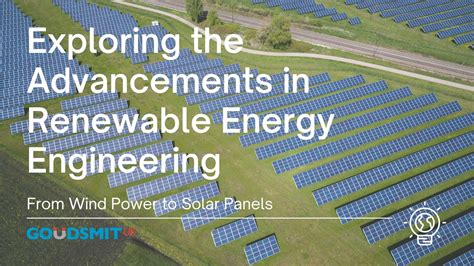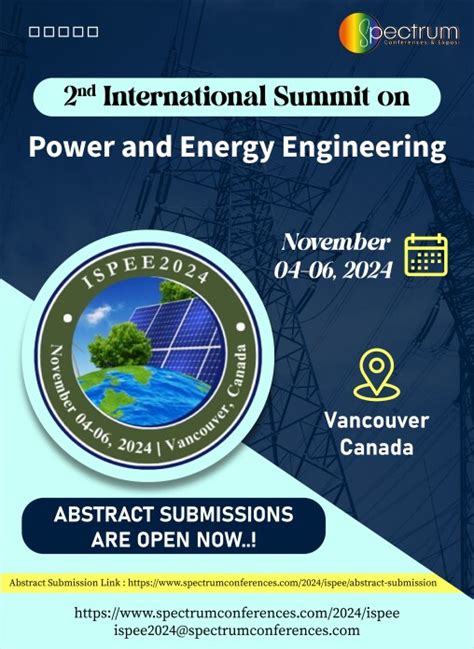The field of power and energy engineering technology has witnessed significant advances in recent years, driven by the need for sustainable, efficient, and reliable energy solutions. As the world grapples with the challenges of climate change, energy security, and economic growth, the development of innovative power and energy technologies has become a pressing priority. With a focus on reducing carbon emissions, improving energy efficiency, and promoting renewable energy sources, researchers and engineers are working tirelessly to push the boundaries of what is possible in this field.
One of the key areas of advancement in power and energy engineering technology is the development of smart grid systems. Smart grids utilize advanced technologies such as artificial intelligence, Internet of Things (IoT), and data analytics to optimize energy distribution, consumption, and management. By enabling real-time monitoring and control of energy flows, smart grids can help reduce energy waste, improve grid resilience, and facilitate the integration of renewable energy sources. For instance, a study by the National Renewable Energy Laboratory found that the widespread adoption of smart grid technologies could reduce peak electricity demand by up to 20% and decrease greenhouse gas emissions by up to 12%.
Key Points
- Advances in power and energy engineering technology are driving the development of sustainable, efficient, and reliable energy solutions.
- Smart grid systems are being developed to optimize energy distribution, consumption, and management, with potential benefits including reduced energy waste and improved grid resilience.
- Rapid advancements are being made in renewable energy technologies, including solar, wind, and hydrogen fuel cells, with significant cost reductions and improved efficiency.
- Energy storage technologies, such as batteries and supercapacitors, are playing a critical role in enabling the widespread adoption of renewable energy sources.
- Electric vehicles are emerging as a key driver of growth in the power and energy engineering technology sector, with significant implications for energy demand and grid management.
Renewable Energy Technologies

Rapid advancements are being made in renewable energy technologies, including solar, wind, and hydrogen fuel cells. The cost of renewable energy technologies has decreased dramatically in recent years, making them more competitive with fossil fuels. For example, the cost of solar energy has fallen by over 70% in the last decade, while the cost of wind energy has decreased by over 50%. These cost reductions, combined with improvements in efficiency and technology, are driving the widespread adoption of renewable energy sources. According to the International Energy Agency (IEA), renewable energy sources are expected to account for over 60% of global power generation by 2050.
Solar Energy
Solar energy is one of the fastest-growing renewable energy sources, with solar panel installations increasing by over 20% annually. Advances in solar panel technology have improved efficiency and reduced costs, making solar energy a viable option for both residential and commercial applications. For instance, bifacial solar panels, which can generate electricity from both the front and back sides of the panel, have become increasingly popular, with some manufacturers reporting efficiency gains of up to 25%.
| Renewable Energy Source | Cost Reduction (2010-2020) |
|---|---|
| Solar Energy | 72% |
| Wind Energy | 55% |
| Hydrogen Fuel Cells | 40% |

Energy Storage Technologies

Energy storage technologies are playing a critical role in enabling the widespread adoption of renewable energy sources. Batteries, in particular, have become a key component of energy storage systems, with advancements in lithium-ion battery technology driving significant improvements in efficiency and cost. Other energy storage technologies, such as flow batteries and supercapacitors, are also being developed, offering promising solutions for long-duration energy storage and grid stability. According to a report by BloombergNEF, the global energy storage market is expected to reach 1,095 GWh by 2040, with batteries accounting for over 80% of the market share.
Electric Vehicles
Electric vehicles (EVs) are emerging as a key driver of growth in the power and energy engineering technology sector, with significant implications for energy demand and grid management. As EVs become increasingly popular, there will be a growing need for advanced charging infrastructure and energy storage systems to support their adoption. According to the International Council on Clean Transportation, there will be over 140 million EVs on the road by 2030, representing a significant opportunity for power and energy engineering technology companies to develop innovative solutions for EV charging and energy management.
In conclusion, the advances in power and energy engineering technology are transforming the way we generate, distribute, and consume energy. With a focus on sustainability, efficiency, and reliability, researchers and engineers are working to develop innovative solutions to meet the world's growing energy needs. As the energy landscape continues to evolve, it is likely that we will see significant advancements in renewable energy technologies, energy storage systems, and electric vehicles, driving a more sustainable and efficient energy future.
What are the key challenges facing the widespread adoption of renewable energy sources?
+The key challenges facing the widespread adoption of renewable energy sources include intermittency, energy storage, and grid integration. However, advances in energy storage technologies and smart grid systems are helping to mitigate these challenges and enable the integration of renewable energy sources into the grid.
How are electric vehicles impacting the energy landscape?
+Electric vehicles are emerging as a key driver of growth in the power and energy engineering technology sector, with significant implications for energy demand and grid management. As EVs become increasingly popular, there will be a growing need for advanced charging infrastructure and energy storage systems to support their adoption.
What role will energy storage technologies play in the future of energy?
+Energy storage technologies, such as batteries and supercapacitors, will play a critical role in enabling the widespread adoption of renewable energy sources. By mitigating intermittency and ensuring a stable energy supply, energy storage technologies will be essential for a sustainable and efficient energy future.



